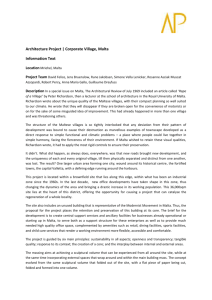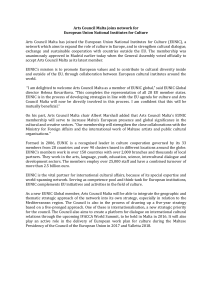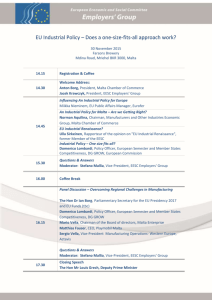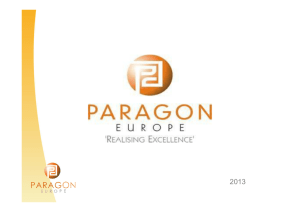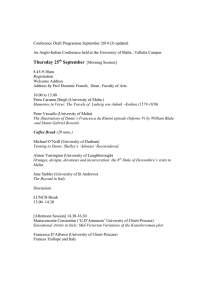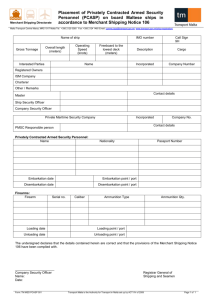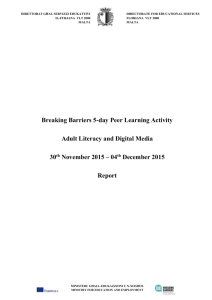National Quality Report: Malta University of Malta Michelle Attard
advertisement
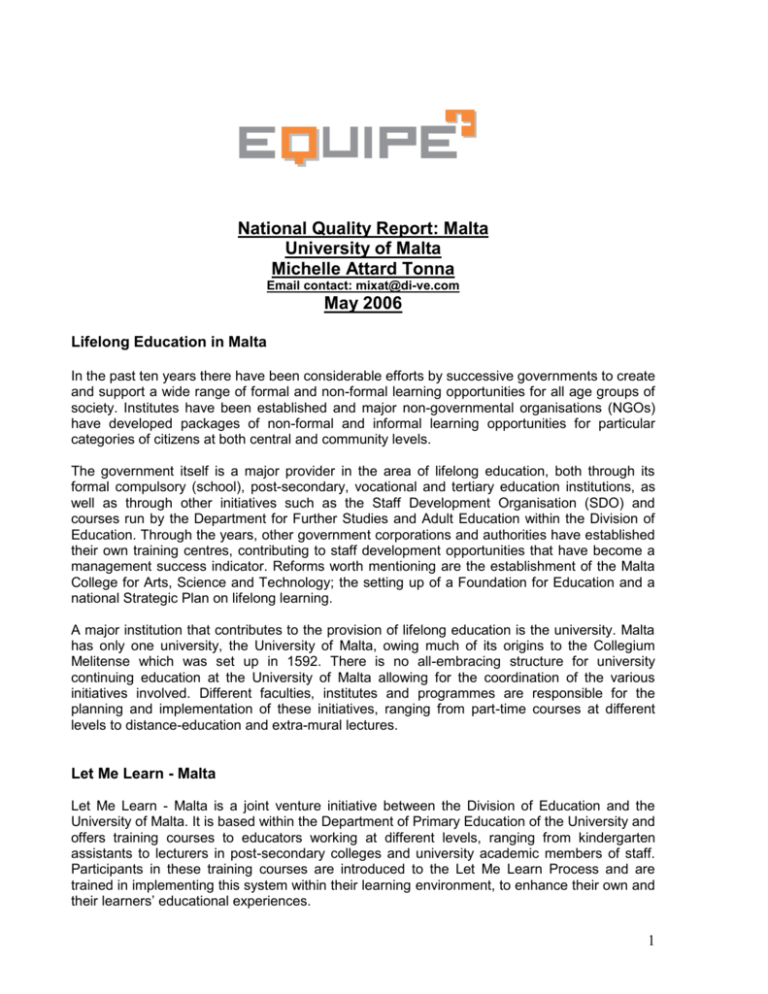
National Quality Report: Malta University of Malta Michelle Attard Tonna Email contact: mixat@di-ve.com May 2006 Lifelong Education in Malta In the past ten years there have been considerable efforts by successive governments to create and support a wide range of formal and non-formal learning opportunities for all age groups of society. Institutes have been established and major non-governmental organisations (NGOs) have developed packages of non-formal and informal learning opportunities for particular categories of citizens at both central and community levels. The government itself is a major provider in the area of lifelong education, both through its formal compulsory (school), post-secondary, vocational and tertiary education institutions, as well as through other initiatives such as the Staff Development Organisation (SDO) and courses run by the Department for Further Studies and Adult Education within the Division of Education. Through the years, other government corporations and authorities have established their own training centres, contributing to staff development opportunities that have become a management success indicator. Reforms worth mentioning are the establishment of the Malta College for Arts, Science and Technology; the setting up of a Foundation for Education and a national Strategic Plan on lifelong learning. A major institution that contributes to the provision of lifelong education is the university. Malta has only one university, the University of Malta, owing much of its origins to the Collegium Melitense which was set up in 1592. There is no all-embracing structure for university continuing education at the University of Malta allowing for the coordination of the various initiatives involved. Different faculties, institutes and programmes are responsible for the planning and implementation of these initiatives, ranging from part-time courses at different levels to distance-education and extra-mural lectures. Let Me Learn - Malta Let Me Learn - Malta is a joint venture initiative between the Division of Education and the University of Malta. It is based within the Department of Primary Education of the University and offers training courses to educators working at different levels, ranging from kindergarten assistants to lecturers in post-secondary colleges and university academic members of staff. Participants in these training courses are introduced to the Let Me Learn Process and are trained in implementing this system within their learning environment, to enhance their own and their learners’ educational experiences. 1 The Let Me Learn Process is an advanced learning system that helps teachers and trainers create a learning environment that truly respects diverse learning processes. With the use of theory, instrumentation and a curriculum, it enhances individuals’ awareness of their own thinking processes, thus helping them to create strategies that empower them to take control of their own learning. Understanding how one’s mind operates will allow the individual to intentionally plan his/her learning process. Through the Let Me Learn Process, teachers, together with students and parents, have the opportunity to work together and allow each to gain the most from his/her learning experiences. Besides the services to the schools, Let Me Learn – Malta also offers services to corporations and industries that are interested in promoting learning in their workplace. For example the Grundtvig Let Me Learn Project enables adult educators, human resource developers and counsellors from seven European countries to develop a training model and help adult learners develop strategies to succeed in their learning. Quality arrangements The Let Me Learn Process is continually developing and the direction it takes depends a lot on the context in which it is applied and the participants involved. Its flexibility allows one to offer training, support and mentorship in a very individualized manner with the training programme shaped according to each participant’s needs. It was thus of absolute necessity, for the team involved, to embark on a quality process to ensure that these needs are indeed being met. The two main rationales guiding this quality process are: 1. as a way of auditing the training provided and evaluating the outcomes, if any, that it set out to achieve. 2. as a way of reviewing practice and to recommend any necessary changes. The motivation to undertake this quality process stems mainly from internal sources. The team is continuously looking for ways to review practice, and celebrate successes when they occur. This is an internal obligation that is adhered to. Throughout the year dates are assigned in which meetings and seminars are held to carry out this quality assurance. These are regularly held: a) b) c) d) before the start of a new training programme, at the completion of it, whenever new material is developed and in need of being discussed, whenever the need is felt to review the work or discuss an arising issue. The quality initiative is undertaken primarily for development reasons, but auditing, on an internal basis, will also be carried out with the help of this project. The local context is very supportive, both in terms of auditing and also in terms of development. Learning institutions are continuously under scrutiny and since the teacher training offered, as a programme, is funded by the government, there is always the need to produce reports that demonstrate what work is being done and what outcomes are being achieved. The trainers involved are very open to critical feedback and strongly believe that the training project can only grow if their own practice is evaluated, and thus develops according to the needs of the educators concerned. At times it is also realised that some things need to be changed simply because they do not work, or are not delivering the desired results. This dysfunction at some point in the training prompts the team to modify and adapt accordingly. 2 The principal aim is to evaluate the quality of the training programme which is continuously being modified. Evaluation is based upon the critical feedback of the educators concerned and the team’s reflections after the programme has been completed. The results aimed at from this quality process are: a higher retention rate of educators starting the training programme, aims and outcomes of the training programme are being reached, feedback of the educators concerned is acted upon. This quality process has been devised to be as straightforward and simple to conduct as possible. The dynamics used are those of the training programme itself. A previous tool is lending itself to wider utilities. The results will be truly useful to the organization and its members, easily recognizable and can lend themselves to further positive development. The training programme that is currently being offered has undergone a number of changes, both structure-wise, but also in terms of the material to be covered and the logistics involved. Thus it is very important for the providers to evaluate, step by step, the outcomes of this new scheme. The training gives a lot of emphasis to reflective practice and educators are asked to record their reflections in a journal. This, together with feedback forms provided throughout the training, can help the trainers assess the growth of the participants and the quality of the training provided. This quality arrangement goes beyond the period of training itself. Regular support meetings are held after the training is completed and these, together with the mentoring provided, continue to contribute feedback when the Let Me Learn Process is being implemented in practice. The feedback collected can help the trainers review their practice. External evaluators will be appointed at intervals to give their own observations of the whole process. Reports, following these evaluation procedures, will also be issued. Further information can be achieved through these sources: www.education.gov.mt www.letmelearnmalta.com www.letmelearn.org www.um.edu.mt 3
